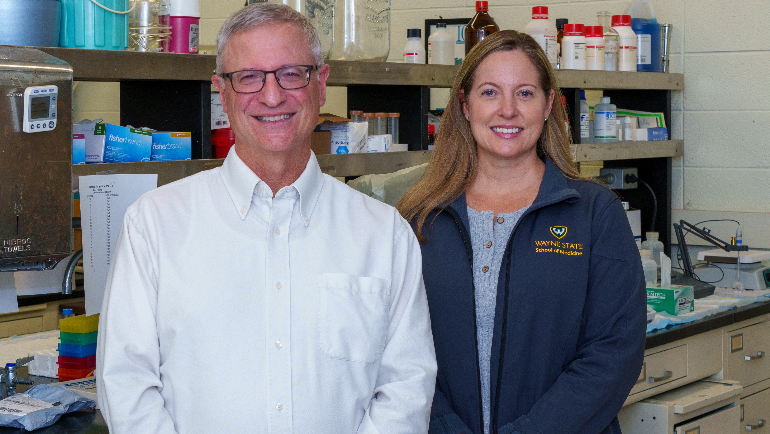NIH renews Berkowitz lab grants worth $7.5 million to continue research on two devastating diseases, including Alzheimer’s

Two National Institutes of Health multi-year grants have been renewed worth a combined $7.5 million to support research at the Wayne State University School of Medicine focused on Alzheimer’s Disease, as well as a blinding disease called retinitis pigmentosa.
The two projects are led by principal investigator Bruce Berkowitz, Ph.D., professor of Ophthalmology, Visual and Anatomical Sciences.
“I am honored to receive these grants aimed at such traumatic diseases, and to be able to continue investigating new approaches for improving patient care based on our work that has spanned over 30 years,” Dr. Berkowitz said.
The research will extend their previous focus on novel imaging biomarker evaluation of oxidative stress in vivo to now include new non-destructive biomarkers of mitochondria activity in vivo using optical coherence tomography, an imaging modality commonly performed across the world in patients.
“Our biomarkers represent first-in-kind indices of mitochondria activity that can be measured in photoreceptors of patients and in animal models non-invasively,” Dr. Berkowitz said. “By identifying mitochondria dysfunction, we can personalize targeted therapies into patients to best mitigate emerging neurodegeneration in sight-threatening disease. Our work also extends our focus from retina-based disease, like retinitis pigmentosa, to diseases like Alzheimer’s disease, which is thought to be a primary mitochondrial disease affecting the retina before plaques show up in the brain and before declines in cognition.”
The work on “Novel Early Retinal Imaging Biomarkers for Treating Later Spatial Memory Loss in Experimental Alzheimer’s Disease” started in mid-September, and is supported by $5.5 million during five years from the National Institute on Aging.
Aging patients remain vulnerable to the devastating dementia associated with Alzheimer’s, a disease with few treatment options to prevent or delay its trajectory. Accumulating evidence highlights hyperactive neurons in its very beginning stages as an important driver of Alzheimer’s disease.
“Remarkably, the prediction that cognitive dysfunction can be restored by treating this early hyperactivity without altering plaque deposition has been confirmed in several AD models,” Dr. Berkowitz said. “Here, we propose novel imaging biomarkers of hyperactive neurons in the retina, the most accessible part of the nervous system, to enable very early evaluation of treatment efficacy in patients at risk for Alzheimer’s disease. Our biomarkers are measured from common imaging method used in patients every day: optical coherence tomography.”
The work is a collaboration between Wayne State University, the University of Michigan, the University of Nebraska and Children's National Hospital.
The second grant, for “Mitigating retinitis pigmentosa based on a non-invasive rod energy-landscape biomarker,” began Sept. 30, and is supported by $2 million during four years from the National Eye Institute.
“We address a long-standing critical barrier to the translation of experimental findings into the clinic: the absence of non-invasive imaging biomarkers of rod energy-landscape dysfunction for early diagnosis and for predicting treatment benefits,” he said. “Our proposed studies will address this technology gap with a unique rod energy-landscape biomarker measured from a clinical-relevant imaging modality, optical coherence tomography, in order to enable future transformative bench-to-bedside bridging of treatment to personalize management and clinical treatment of retinitis pigmentosa.”
He is grateful to his colleagues who will contribute to the projects, his departmental leadership, the School of Medicine and Wayne State University for providing critical support during the years it took to secure these grants, he added.
The project numbers for these NIH grants are R01AG081981 and R01EY034309
Learn more about the work at https://berkowitzlab.wayne.edu/
Contact info
Julie O'Connor
Director, Research Communications
Phone: 313-577-8845
Email: julie.oconnor@wayne.edu